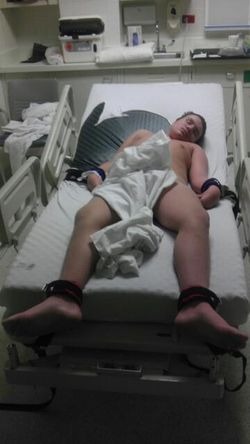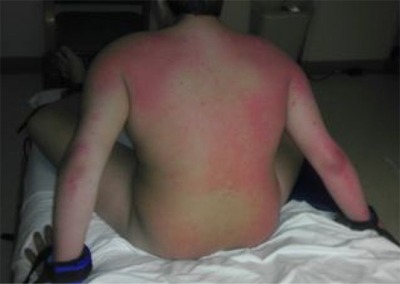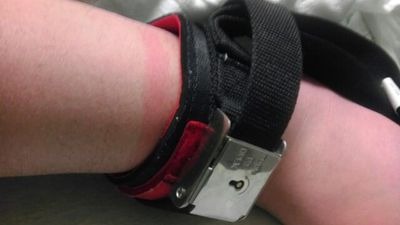Diseases/Conditions
Hospital Locks Down Autistic Boy for 19 Days of Agony
‘The use of antipsychotic, antiepileptic, and mood stabilizing medication may cause one or more side effects that will most likely require additional care management.’ So said the document Alex’s parents were told to sign—and it wasn’t on the hospital’s letterhead! They’ve strapped him down naked for 19 days & want to coerce his parents into this agreement. Please act now to save him!
Update: It’s over. Alex’s mother had no choice. She signed to avoid losing contact with her son. So the doctors will have their way – to drug Alex into oblivion. As if they actually care about him. They’ve made their point clear: Question their authority and you lose your child … and your child loses you.
This medical system created Alex and millions more. They’ve profited from their iatrogenics mightily, but when it comes down to it, all they really want to do is make sure that no one is even able to whimper after they’ve raked in their profits.
Will your child be next?
EMERGENCY UPDATE!! (Tuesday, 12 March 2013)
Alex’s mother is meeting with hospital officials today. She has been informed that she must sign and agree to everything they want to do to her son, or he will be removed from her custody and they will do it anyway. This is not just about Alex. This is about the future of your own right to refuse to allow a hospital or doctor to drug your child into oblivion. Speak out now!
Contact Vice President and CNE, Paula Hindel at 708-216-3802 to express your concerns for Alex’s care.
Let CEO, Larry M Goldberg know what is happening to voiceless children in Loyola’s healthcare system. 708-216-3215
by Lisa Goes
Patient Safety Awareness Week, Spotlighting Loyola University Medical Center: A Parent’s Perspective
“I need to tell you Alex’s story.” Dorothy Spourdalakis, Alex’s mom spoke professionally with a deliberateness I was not expecting—considering she has been by Alex’s bedside awaiting proper medical care for his gastrointestinal symptoms, for 19 days.
19 days. 456 hours. 27,360 minutes. 1,641,600 seconds.
This is Alex.
The irony of this week marking The National Patient Safety Foundation’s “Patient Safety Awareness Week” is not lost on Dorothy. According to her, at 14 years of age, Alex has a diagnosis of severe autism and cognitive impairment. He is non-verbal. In October of 2012, Alex began to suffer neurological events that prevented a healthy sleep cycle. He was awake for many hours at a time. Agitation and aggression ensued as a result of sleep deprivation. During this time, symptoms and behaviors that were indicative of severe gastrointestinal distress developed as well. A cycle of constipation, diarrhea and formed bowel movements surfaced and became a chronic problem. On February 16th at 5:00 am, with the assistance of police and paramedics, Dorothy took her inconsolable and highly-distressed non-verbal child to Gottlieb Hospital in Melrose Park, Illinois.
Because of Alex’s physical aggression, he was placed in locked restraints. At that time, Dorothy did not know the ER would be their home for the next several days, as Alex lay naked, in locked restraints, suffering bouts of violent vomiting, severe constipation and diarrhea. Neither she nor Alex bathed for the next 13 days while hospital staff and administrators attempted to devise a plan to care for Alex. “He was given Colace for his constipation and sometimes it would take security staff and nurses more than 15 minutes to arrive to help unshackle him so he could use the bathroom,” Dorothy explained. “Alex would scream as best he could when he knew he was going to have a vomiting episode, but security took several minutes to respond so Alex would lay in his own vomit, waiting to be released by a representative of security. He would be wiped down and returned to the same restraints.”
Autism Is Medical (AIM), a support group that helps parents identify the underlying medical issues
associated with the label of autism, was contacted on Sunday, February 24th. They were enrolled to help the staff at Gottlieb understand Alex’s complex medical profile. According to one of the AIM representatives, “Clearly, what they are doing isn’t working.” The AIM advocates,(all mothers to children fully recovered from iatrogenic autism), went on to say, “Currently, this child is being treated with Lorazepam, Oxezepam, Benzatropine, Zyprexa and Ativan. These drugs do nothing to address the intense gastrointestinal issues he is experiencing, nor do they alleviate his pain.” Dorothy explained that Alex remains in a highly-agitated state. He was also prescribed Depakote, to which he had an adverse reaction (elevated lipase). In addition to these issues, Alex’s mom explained he has many allergies. Both physicians at Gottlieb and Loyola told her that IgG and IgE food sensitivies were invalid. Dorothy was told by the attending physician to give her son milk at Loyola, not in the ER. When a possible reaction occurred she was told the bed caused his contact dermatitis.
Alex was not assigned to a room at Gottleib and was never formally admitted as a patient. He remained in an ER bay during his entire stay at Gottlieb. He was transferred to Loyola University Medical Center on February 28th at 3:00 p.m. after 13 days in the hopes that they could better serve his needs. It was determined that he needed the care of a pediatric gastroenterologist, neurologist and anesthesiologist, and Loyola could provide those services. On Friday, March 1st, a GI (gastrointestinal) consult was ordered.
Alex and Dorothy were not visited by a gastroenterologist until March 5th, four days after their admission. The physician took an oral medical history on Alex and expressed that he wasn’t sure why they were doing this procedure, and that Alex would be pushed back for some reason having to do with the pediatric anesthesiologist’s “complicated” schedule, according to Dorothy. In the 15 minutes the gastroenterologist spent in the room with Dorothy and her son, an event that was 17 days in the making, he did not see the need to perform a physical exam on Alex.
On March 6th, Dorothy met with another gastroenterologist who observed that Alex was indeed in pain. For the first time in 18 days, it was recognized that he was in pain by someone in the hospital system. Dorothy was encouraged. Gastroenterologist number two scheduled the appropriate procedures – procedures AIM founders believe would have been ordered much sooner for a neurotypical child.
 Within hours of meeting with the second gastroenterologist, a CNE (Certified Nurse Executive) spoke with Dorothy and asked to meet with her about insurance issues. During the meeting, she was asked to sign the paper attached in the photo above (click image to enlarge) immediately. Dorothy was hesitant because, “The form is not printed on Loyola letterhead as is the standard policy for routine hospital documentation.” According to Dorothy, during this meeting the CNE admitted the JACHO (Joint Commission on Accreditation of Healthcare Organizations) required assessments of a restrained child by a physician every four hours to reassess his need to remain in locked restraints had not been met. Dorothy said the CNE explained that they may “have missed a few.” (Read more about ethical restraint practices.)
Within hours of meeting with the second gastroenterologist, a CNE (Certified Nurse Executive) spoke with Dorothy and asked to meet with her about insurance issues. During the meeting, she was asked to sign the paper attached in the photo above (click image to enlarge) immediately. Dorothy was hesitant because, “The form is not printed on Loyola letterhead as is the standard policy for routine hospital documentation.” According to Dorothy, during this meeting the CNE admitted the JACHO (Joint Commission on Accreditation of Healthcare Organizations) required assessments of a restrained child by a physician every four hours to reassess his need to remain in locked restraints had not been met. Dorothy said the CNE explained that they may “have missed a few.” (Read more about ethical restraint practices.)
The same CNE, who previously had promised a plain-clothes security officer for Alex’s room, stated at this meeting there was some confusion on this issue, and he would not be receiving that additional support because it was against hospital policy.
This is the stagnant state Alex has been living in for the past 19 days.
19 days. 456 hours. 27,360 minutes. 1,641,600 seconds.
Alex remains in locked restraints awaiting appropriate medical testing and follow-up care. Dorothy is concerned that no one has given her a plan as to what the exact goals are for his healthcare or how they will be achieved. She is concerned about “weaning” him off the restraints as well. No hospital personnel have addressed this with her. “He has been conditioned to them, now,” she stated.
I asked Dorothy what she wants people to know about what has happened to her son Alex: “I want people to know this is what is happening. They need to know, children with special needs, especially autism, children with cognitive impairments are all at risk for this sort of treatment. All families are at risk. Families who do not speak English, or speak English as a second language are at risk, too. This is how the system is set up. Elderly people are at risk. Who is protecting these children and adults? How can we as a society allow this to happen to our weakest? This is apparently the norm. Their medical needs are met with medications that do nothing to address their physical illnesses but purposefully make them silent and unable to protest any longer. Is this all we have to offer our children, our family members, parents and spouses?” she implored.
The members of AIM confirmed Dorothy’s concerns: “There is no plan for him. Patients who suffer from disabilities are at risk for abuse and neglect. In a day where patient satisfaction scores determine reimbursement rates, and hospitals are competing for market share, I wonder if this same story would unfold if the patient was admitted for heart disease or elective surgery. Policies and safety measures are already in place in every hospital system and acute care facilities across this nation. Internal regulatory audits for things like restraint use, falls and infections are done routinely. Loyola’s website shows pictures of happy patients getting the treatment they need. It highlights partnerships with physicians, a team approach for high-risk pregnancies, their cardiology program — one of the leading in the nation, and the benefit of second opinions. Apparently that type of care isn’t available to children with an autism disability. We entrust our doctors and healthcare institutions to take care of our children who can’t speak for themselves and can’t advocate for their own safety. Where is the picture of Alex, locked in restraints, covered in a rash on their website? Please call them and let them know the entire autism community is watching.”
Contact Vice President and CNE, Paula Hindel at 708-216-3802 to express your concerns for Alex’s care.
Let CEO, Larry M Goldberg know what is happening to voiceless children in Loyola’s healthcare system. 708-216-3215
Lisa Joyce Goes is a free-lance essayist, Contributing Editor for Age of Autism, and Co-Founder of The Thinking Moms’ Revolution.
Tagged alex hospital, alex hospital mistreatment, autism, autism iatrogenic, autism treatment, boy in pain locked down for 19 days, conventional medicine, hospital autism, hospital iatrogenic treatment, hospital mistreatment, modern medicine, pharmaceutical drugs, pharmaceuticals


















Pingback: Autistic Boy's Case Worsens: 22 Days in Pain & No TreatmentGaia Health
Pingback: Tired Moms, Ignored Worlds: My Time with Alex & His Mom | Gaia HealthGaia Health